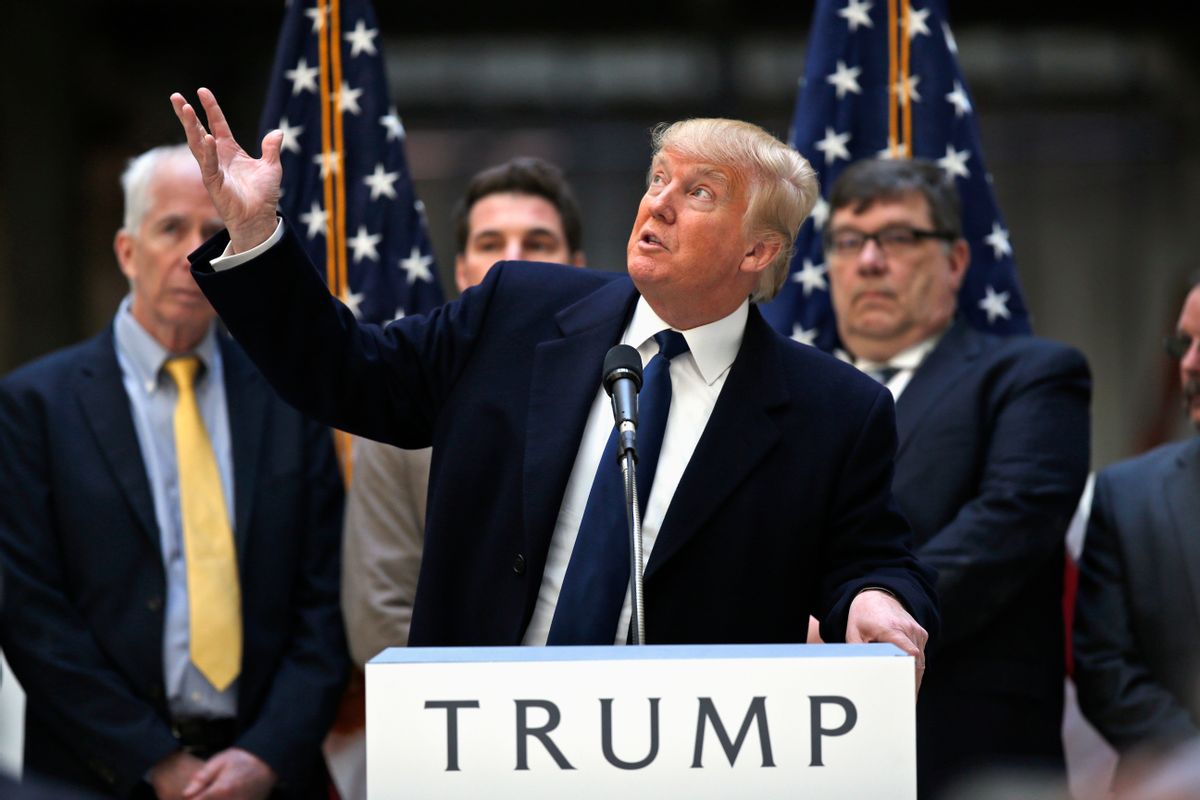If they win the White House in 2016, Democrats have another problem: Republicans control both the House and the Senate. Indeed, House Republicans have their largest majority since 1928 – 247 seats to 188. The GOP's historic influence in both chambers of Congress has rendered the country ungovernable. When the Tea Party movement exploded in 2009, dozens of right-wing nihilists descended on Congress with one goal: obstructionism. As a result, the Republican death-grip on the nation's legislative branch has been near-total.
President Barack Obama accomplished a lot in this climate, but there's no question he would've achieved much more with either a Democratic majority or a serious opposition party, a party whose leader in the Senate doesn't say “Our top political priority over the next two months years should be to deny President Obama a second term.” That's not leadership – it's political arson.
A potential silver lining to Donald Trump's ascendance is that it threatens the GOP's 30-seat majority in the House. The party has legitimized a hate-baiting strongman, after all. You can't insult Veterans, women, Mexicans, Muslims and disabled people without paying a political price, right?
Democrats believe Trump's rise may be an opportunity to alter the congressional landscape. From Politico:
“Democrats have for the past year discussed the GOP's 30-seat majority as a long-term problem, solvable only by shrinking it over successive elections. But Trump's remarkable rise in the GOP presidential race, and the backlash he has already provoked among the broader electorate, has suddenly raised the prospect of a large November wave against Trump and the Republicans who would share the ballot with him.”
The panic is spreading far and wide within the Republican Party. So toxic is Trump that his presence at the top of the ticket puts scores of down-ballot races into play. Flipping 30 seats is a tall task, but without Trump it would be utterly unthinkable – with him it's a possibility. “High numbers of independent voters, socially moderate voters, millennials and minority voters” will be up for grabs, said DCCC Chairman Ben Ray Lujan. And even with an extremist candidate like Ted Cruz (the most likely alternative to Trump) leading the ticket, the prospects are scarcely better.
Last Friday, the Cook Political Report downgraded the GOP's chances in 10 congressional districts. Overall, Cook rates 31 Republican seats as at risk – that's not nearly enough if the Democrats want to retake the House, but it's far more sanguine than anyone expected a year ago. Ultimately, though, the prospects of transforming the balance of power in Congress remain vanishingly slim, even against the backdrop of a Trump candidacy.
Lost in the Democratic optimism is a rather frustrating fact: Were it not for Republican gerrymandering, the potential to flip Congress would be considerably greater. The truth is that the GOP's control of Congress is itself a scandal. Consider this: Obama won a second term in 2012. He was the fourth president in the last hundred years to win two elections with more than 50 percent of the popular vote. Furthermore, Democratic congressional candidates received 1.4 million more votes than their Republican opponents in 2012. And yet Republicans lost only eight seats that year. In a remotely representative system, such results would not be possible.
Something like 55 percent of America's congressional districts have been redrawn to favor the GOP, while a paltry 10 percent have been redrawn to favor Democrats. It's difficult to overstate how anti-Democratic that is. Republicans have essentially short-circuited the Democratic process. They've used advanced technology and algorithms based on the most recent census data to redraw borders and create the safest districts possible. As Karl Rove, who backs the Republican State Leadership Committee (RSLC), which has spearheaded the gerrymandering campaign, wrote in 2010, “He who controls redistricting can control Congress.” And that's what they've done – control Congress by controlling district boundaries. It's the only reason why Republican influence in Congress doesn't scale with GOP support nationwide.
So despite the excitement among Democrats, there are good reasons for skepticism. There will be some Trump-related collateral damage - most Republicans understand that. “The hardest part about it is having to answer every time the nominee says something,” said one GOP consultant. “If he says this, 'Do you agree?' If he says that, 'Do you agree?' That's the hardest part, not being able to control your race more. I think Trump makes every district tougher and every state tougher for a Republican.”
I'm not sure Trump makes every district and state tougher for Republicans, but he certainly puts them in a difficult position. There's no quick fix either. Trump is the party now – he's what they've become. He may be a dream candidate for the angry, culturally isolated base, but he's a repellent everywhere else. Nevertheless, they're stuck with him. They can rely on parliamentary tricks at the convention to undermine his nomination, of course, but doing so will drive thousands of voters away from the party in a general election.
In any event, the Democrats will surely regain some seats in November, and Trump will likely help with that project. But we can say confidently that the Republicans won't lose nearly as many seats as they should. They've rigged the system in advance, almost in preparation for a crisis just like this one.
That's the real scandal.

Shares